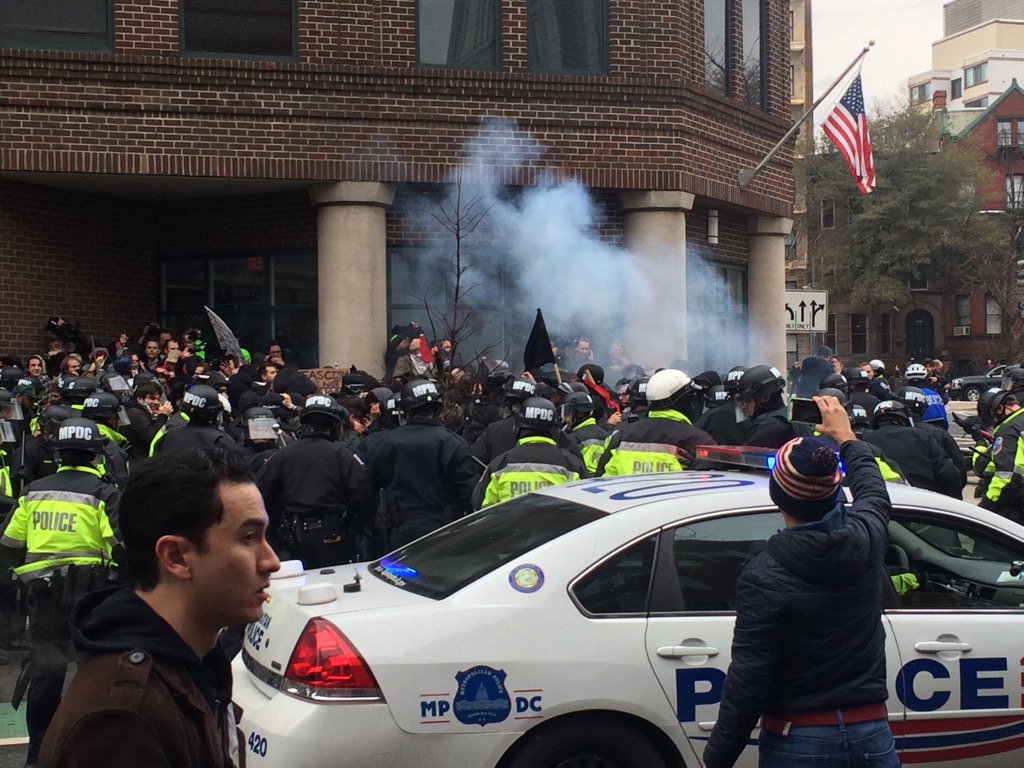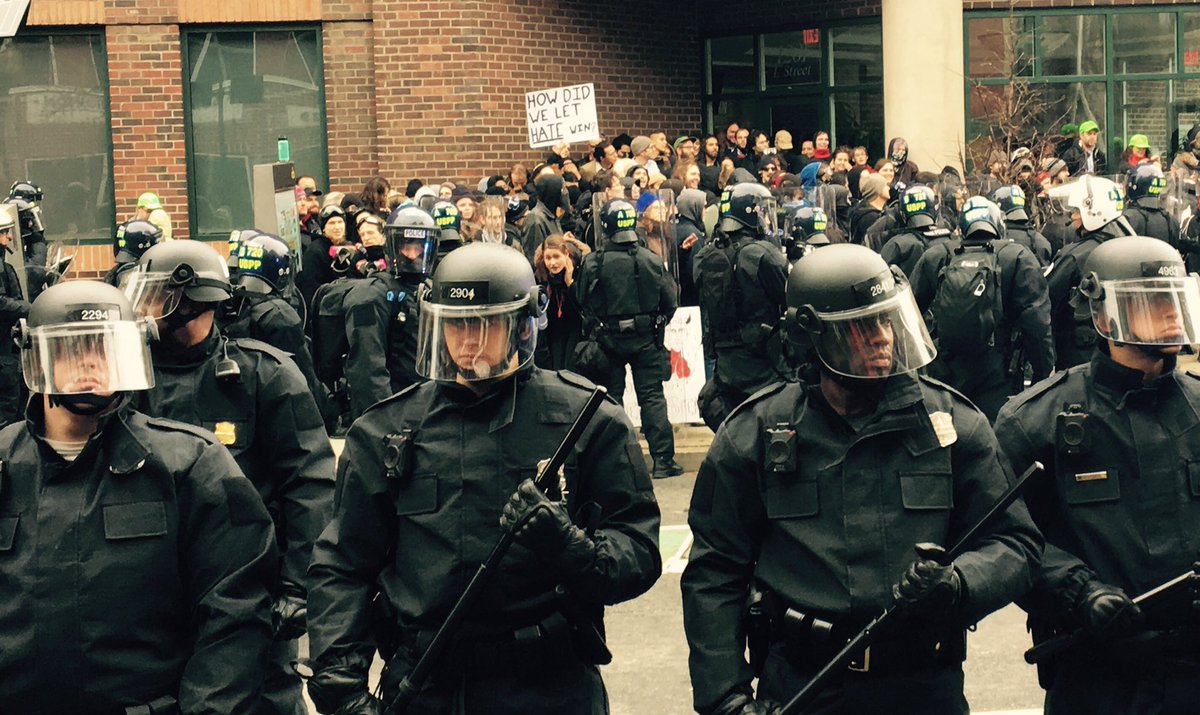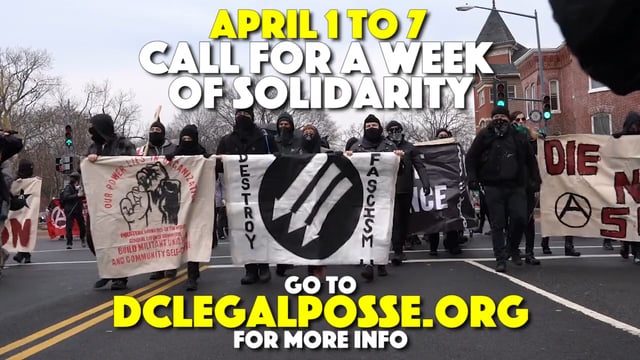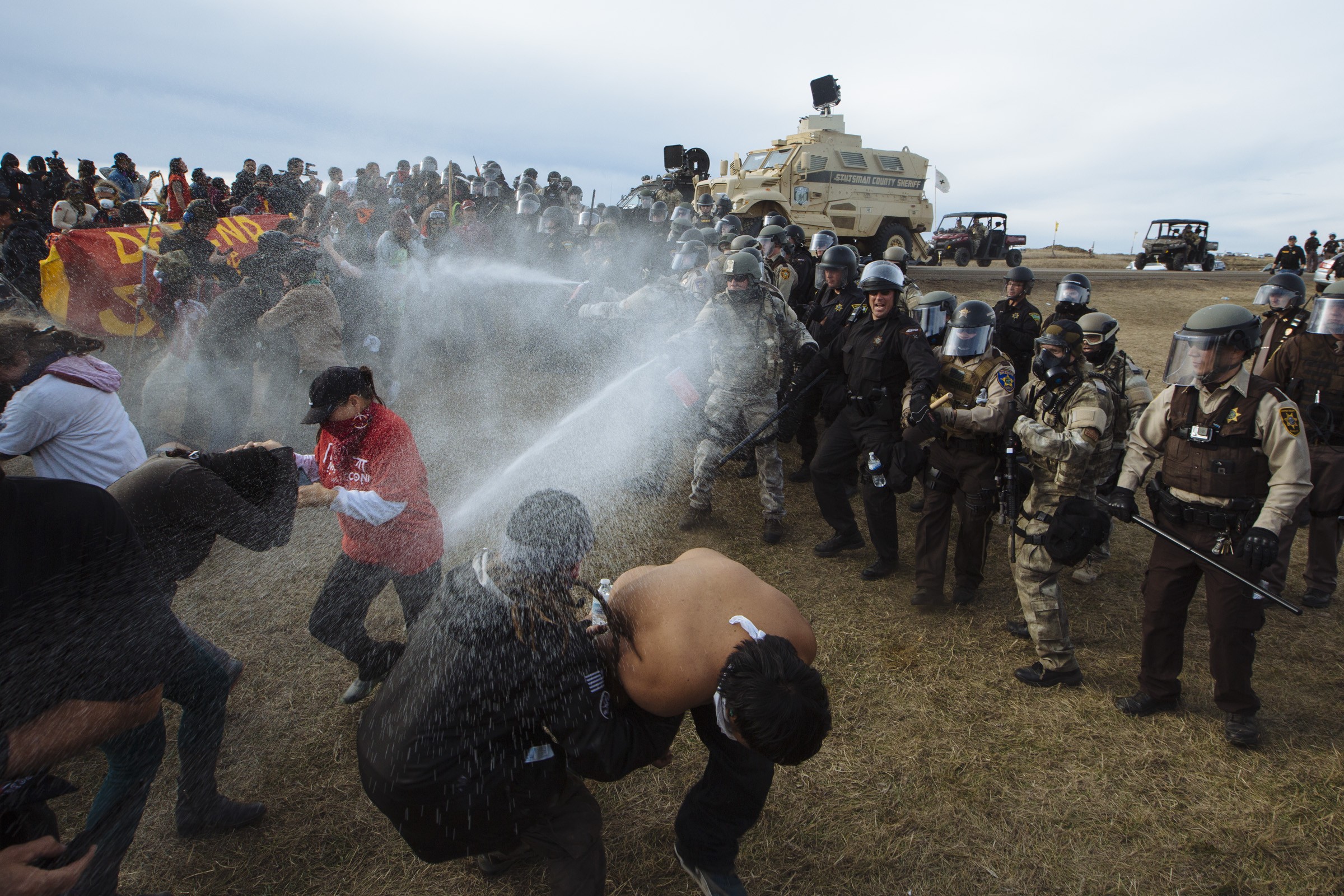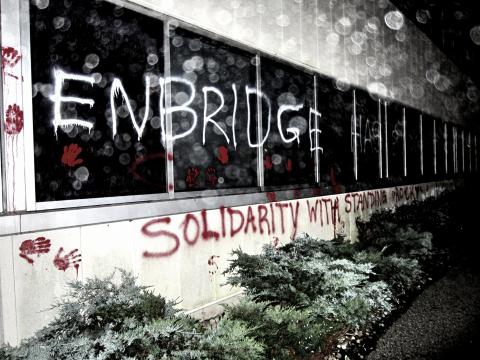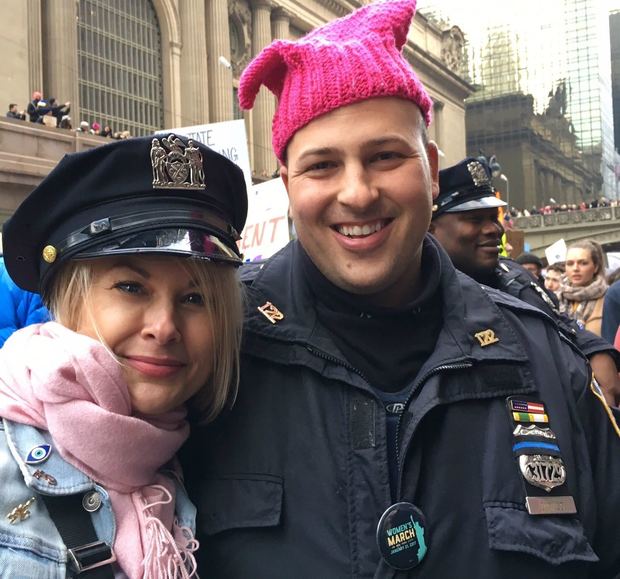Filed under: Anarchist Movement, Bloc Party, Featured, Interviews, Repression, US
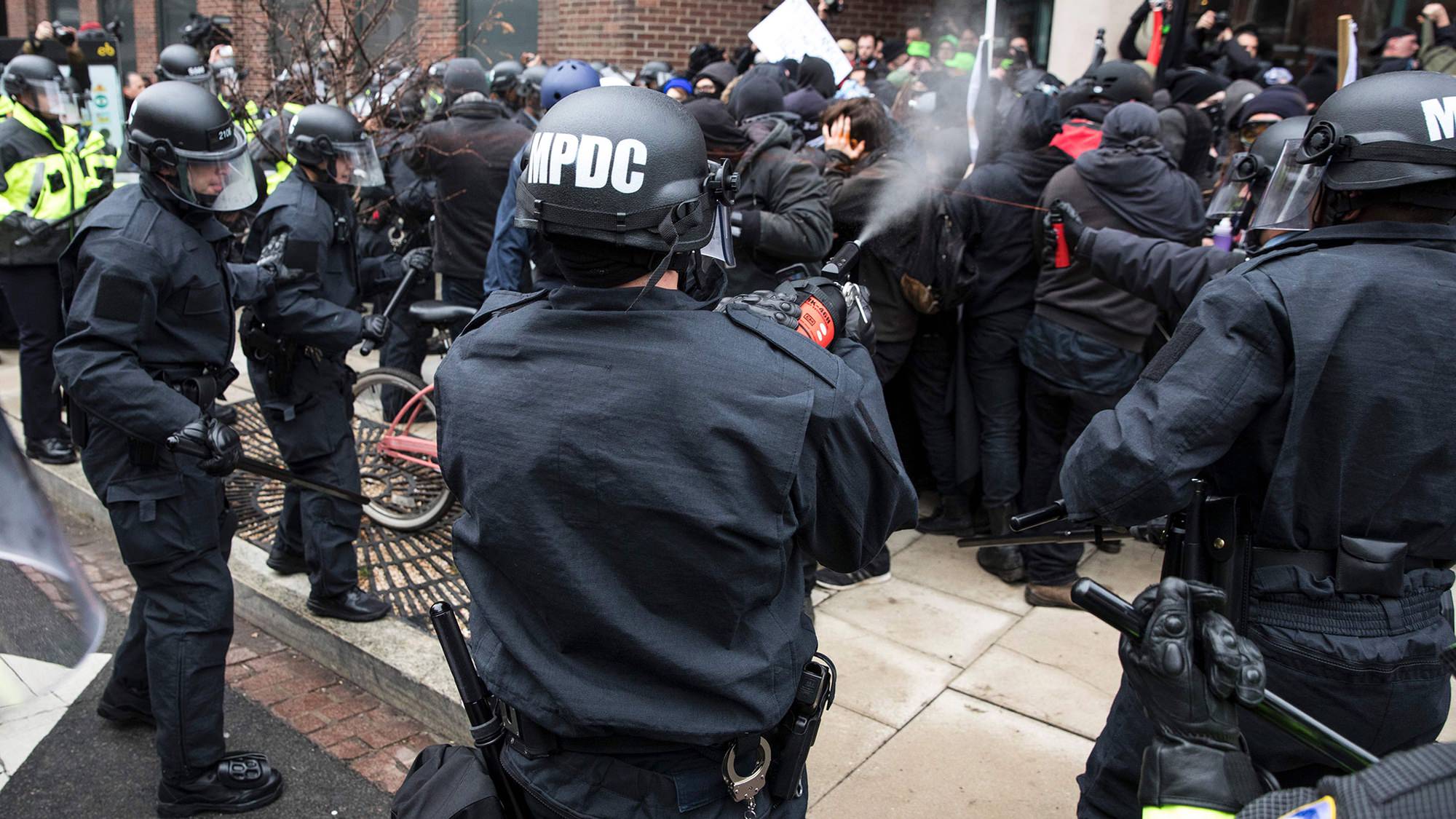
As we are sure our readers are aware, the inauguration of Donald Trump was marred by protests, blockades, and plenty of other rowdiness. Shortly after a black bloc of around 700 people chased off right-wingers from the Black Lives Matter DC security blockade, 230 protesters were rounded up in a kettle at the intersection of 12th and L streets. This group included street medics, legal observers, bystanders, and journalists. These folks were held for 9 hours without access to food, water, or bathrooms and were even attacked with chemical agents while they were kettled. After being arrested folks were subjected to further denial of medical help and some people were held on buses or in solitary for no apparent reason. Vegans and folks with other religious or medical dietary needs were not accommodated. Once people were released, they found themselves facing felony riot charges, and a few have since seen additional charges added. Only about 16 have since had their charges dropped.
While we hope that books and articles will be written about the full length of the D.C. J20 case, we also believe there are things to learn and stories to be told in the midst of state repression. For some useful info on previous mass arrests, check out this rad interview with Kris Hermes, author of the book “Crashing the Party”. This updated reflection from folks over at Crimethinc is another good resource for better understanding of recent histories of resistance to inaugurations, as well as this immediate reflection on lessons learned from the L12 kettle. After all, every specific instance is different, and we really are just learning as we go. Keep your eyes open for solidarity events in your region, as the week of solidarity against state repression draws near, April 1st-7th.
Now, one arrestee’s perspective from the kettle at L12…
When Trump was elected, I was immediately overwhelmed with anger and fear. While all presidencies in the U.S. are inherently oppressive, Trump’s campaign was built on expanding imperialist violence and fostering a white supremacist culture. I knew that under his rule the world was only going to become a more hostile place for marginalized folks and the environment. After the election, I decided very quickly that I would be showing up in D.C. on inauguration day to say “fuck this noise.”
Black Lives Matter activists have chained themselves to a checkpoint. #disruptj20 #Inauguration pic.twitter.com/zqF8xIQyc2
— Alyson Ann Cina (@AACina) January 20, 2017
I ended up in the bloc because I didn’t feel prepared to help with the parade blockades. I didn’t want to be that physically close to the inauguration and being surrounded by Trump supporters. Looking back at this makes me laugh because I ended up being chased and attacked by cops, who are Trump’s foot soldiers. I see the bloc and the blockades as two different components of a larger expression of resistance and refusal of the Trump regime.
Police and protesters clash as law enforcement tries to break up checkpoint blockade #disruptj20 #Inauguration #cunyjvote16 pic.twitter.com/BAAONpmxGS
— Mallory Moench (@mallorymoench) January 20, 2017
Have you participated in any mass mobilizations before J20? If not, how did it differ from your expectations going in? If so, how did it differ from previous experiences?
J20 was the biggest mobilization that I have ever participated in, so I really didn’t know what to expect. It felt emboldening to be a part of such a large mobilization. Folks have written a lot about how Trump is an abuser and manipulator both in his personal relationships and as a politician. Trump and his administration use gaslighting and intimidation as a way to manipulate the public and subdue resistance. So for me – with the identities and experiences I have – it felt really affirming to be among so many other people expressing the same outrage that I was feeling. It validated that it’s not just me and my friends who are feeling such heightened grief and terror. By coming out in the street, it was as if they were saying: “its not just you.” It is a powerful experience to be with others who are willing to take risks alongside you.
Have you personally experienced state repression of this level or been close to people who have?
I haven’t personally. My
By the time I was put in handcuffs, part of the festival of resistance
Up until this
Many of us were kept in cars or on buses for hours, most of us were zip tied for over eight hours. Most people had no access to bathrooms or water, and people were forced to piss themselves in the wagons. Some were given access to bathrooms but without having use of their hands, there was a cop there to “help” or “supervise” the arrestee with trying to use the bathroom. I heard one particularly awful story about one arrestee treating another for pepper spray while in zip ties. The sheriffs and cops seemed to look confused every time anyone reminded them that people were covered in pepper spray. Our eyes and skin were left burning for almost two days.
While we were in paddy wagons, they often blasted the heat so high that we would sweat, opening our pores and causing the spray to reactivate and drip into our eyes, as well as dehydrate us even further. It seemed very intentional. The cops met our requests for food and water often by saying “we don’t have the ability to do that” or “that’s not our job,” while they sat outside the wagons or buses eating pizza and smirking at us. I personally wasn’t given anything to drink for 9 hours, and even then it was only a dentist-office-sized paper cup of sugary fruit punch.
I didn’t cry the whole time I was in custody, so when I walked outside
Did you feel supported through the initial arrest and release process? What did that look like in terms of support?
Absolutely. One of the U.S. marshals had made a comment about how many people were waiting outside for us in the most disappointed tone, but I wasn’t expecting such a large group of supporters. I was immediately enveloped into a group of people jumping up and down and chanting an antifascist song. I felt like an anarchist quarterback.
People had a bag of supplies
There is a
I don’t know if there is ever a way to be fully prepared for the violence of the police, but I didn’t feel surprised by most of what they did. The violence they commit on a daily basis towards oppressed communities, the violence we have seen at Standing Rock, the violence they have brought on uprisings in Ferguson, Baltimore, Milwaukee, Oakland, and Charlotte
There is a call for a week of solidarity with all those facing state repression, from Standing Rock to anti
The police enforce the social order, so that is one major connector in all of these struggles. Trump and his administration are clearly influencing and directing how repression is being executed
The first thing that comes to mind in terms of building further solidarity is that folks from different struggles should be reading and informing themselves about other struggles
History also shows us the first steps towards fascism are always to repress and increase
I’ve been surprised by how few people knew about the kettle at L
I was also surprised by just how much support we have gotten from other radicals, leftists,
What are some things you hope to accomplish through this whole ordeal?
The increase of state surveillance and the proto-fascism of the Trump
How can people support you and other defendants?
People
Parts of this experience
I was also caught off guard by how traumatizing it could be for those of my friends who didn’t get arrested. The brutality of the police and the jail wasn’t just experienced by those of us in the kettle. During and after being pepper sprayed, beaten, and having stinger grenades lobbed at them for hours, they still had to try and track their friends through the courts. There was no clarity around what precinct anyone was taken to, and because of the intensity of the police response, it was often unclear if people were in custody or in the hospital. There were people standing outside of the kettle who witnessed some folks in the kettle being taken
DC police firing flash bangs at #DisruptJ20 #InaugurationDay blac block | via @Patrick_Madden https://t.co/XT3Xh7e558
— agitator in chief (@soit_goes) January 20, 2017
Take strong hearts, friends, and make sure keep checking here, as well as Crimethinc and Submedia.tv for consistent updates during the week of solidarity. From D.C. to Standing Rock, Sacramento to New Orleans, Berkeley to Minneapolis, Pittsburgh, and Arivaca, AZ. Fuck Prisons, Fuck Police, Fuck Pipelines, Fuck Borders, and the world they maintain!
– some bad kids from the bloc



